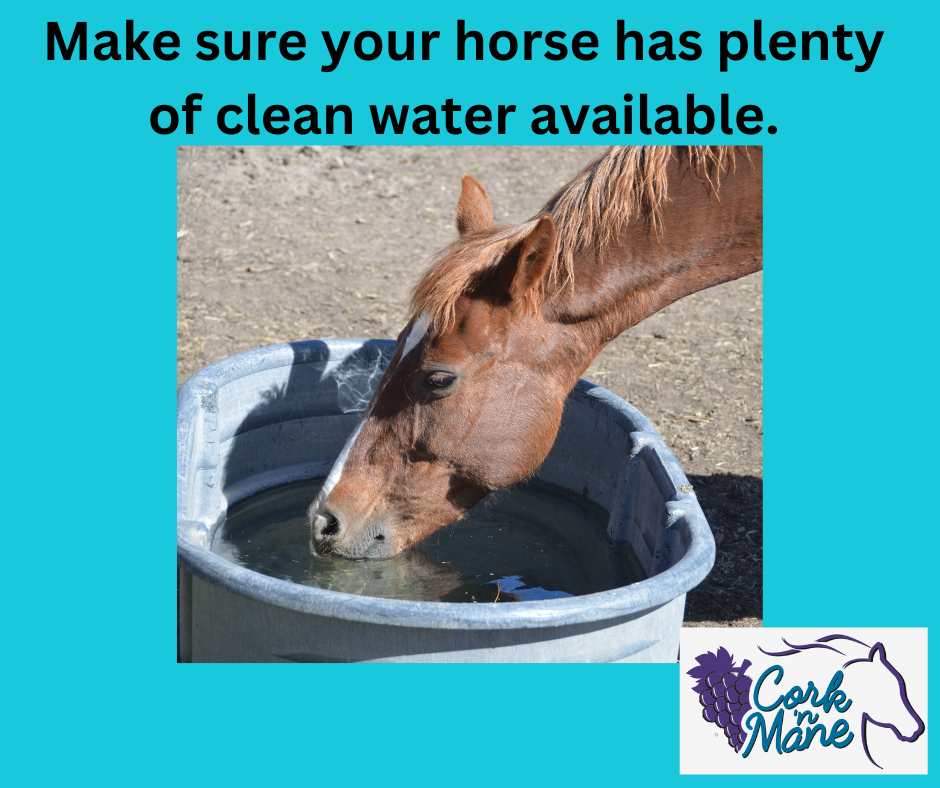Hydration and Your Horse
You can lead a horse to water but you can’t make them drink! Making sure your horse gets enough water is very important.
This early proverb is a metaphor that is believed to have originated in England in the 12th century. It first appears in written form in a collection of proverbs written by John Heywood in 1546. However, it didnt have anything to do with horses - more about forcing someone to do something!
Jokes and proverbs aside we know how important hydration is for our horses but how can we be sure they are getting enough water?
How Much Water Should My Horse Drink?
The General Rule:
Horses typically require around 5 to 15 (20–55 Liters) gallons of water per day, but this amount can vary depending on factors such as weather conditions, activity level, and size of the horse.
As a basic guideline, a horse should drink approximately 0.5 to 1 gallon of water per 100 pounds of body weight.
Factors to Consider:
Weather: Hot and humid conditions can increase your horse's water requirements. Make sure to offer more water during these times. For example, a 1,100-pound horse in a cool environment may drink 6–10 gallons per day, while the same horse in a hot environment may drink up to 15 gallons per day. On the flip side, low humidity causes moisture to be wicked away quickly.
Shade: Does your horse have access to shade when they are outside? this may be some large trees, shade from a building, or a run-in or loafing shed.
Activity Level: Horses that are working or exercising will need more water to stay properly hydrated.
Health Conditions: Certain health issues like diarrhea can lead to dehydration, so monitor your horse's water intake closely during such times. Also, consider pregnant mares. Lactating mares may also drink more water to support milk production, increasing their water consumption by 37–74%.
Feed Type: Horses on a diet of dry hay will need more water compared to those on lush pasture. Feeds such as whole grains or alfalfa pellets need water for proper digestion.
How Can I Encourage My Horse To Drink?
Encouraging Water Intake:
Always ensure fresh, clean water is readily available for your horse.
Use the two bucket system and add electrolytes to one of the buckets.
Consider offering salt blocks to encourage drinking (and appropriate mineral intake).
Provide water at a comfortable temperature, especially during extreme weather conditions.
Remember to scrub out water buckets and tanks weekly. Don’t use soap just a good scrub brush and rinse thoroughly.
You need to keep hydrated too! Check out our store for custom-designed Tumblers and Mugs!
How Do I Monitor My Horses Intake?
Monitoring your horse's water intake is crucial for their health and well-being. Here are some tips to help you keep track effectively: Per this Kentucky Equine Research article.
Keep track of water buckets: Make sure your horse has access to clean, fresh water at all times. Check and refill water buckets or automatic waterers regularly, especially in hot weather or after exercise. Obviously, this works best when there is one horse per stall or paddock.
Observe your horse: Pay attention to your horse's behavior and attitude. Increased water intake could be a sign of dehydration or an underlying health issue.
Check their gums: feel your horse’s gums to see if they feel moist. Healthy gums are bubblegum pink!
Skin Test: You can also do a skin test by pinching a small area of skin on their neck or shoulder and watching to see if it springs back to its normal position.
How can I keep my horses hydrated while showing or on endurance rides?
1. Preparation is Key:
Before the Event: Make sure your horse is well-hydrated in the days leading up to the show or ride.
On the Day: Bring enough water from home that your horse is familiar with. sometimes your horse may curl up their lip at water that smells or tastes different.
Trail/Endurance Ride: Map out the ride and check for watering stations along the way. Bring water if necessary.
2. Frequent Water Breaks:
Encourage your horse to drink at every opportunity.
Offer water at regular intervals during breaks in the event.
3. Electrolytes:
Consider adding electrolytes to your horse’s water or feed to help them retain hydration.
Consult your vet for proper dosage instructions.
4. Balance Diet:
Feed your horse high-moisture hay before and after the event.
Avoid feeding dry feeds exclusively, as they require more water to digest.
5. Monitor Signs of Dehydration:
Watch out for symptoms like dry gums, sunken eyes, or loss of skin elasticity.
Act immediately if you notice any signs of dehydration.
6. Cooling Techniques:
Use water to sponge your horse’s neck, body, and legs to help with cooling.
Avoid using ice-cold water, as it can constrict blood vessels.
7. Post-Event Care:
After the event, continue to offer water and monitor your horse’s hydration levels.
Allow time for your horse to rest and recover before traveling back home.
Read our article on the 10 Essential Steps To Complete Before Spring Show Season and Training
Can a horse drink too much water?
Some horse ailments such as Cushing’s disease cause a horse to exhibit polydipsia, or excessive drinking. Too much water can cause stress on the kidneys.
Consult your vet: If you notice any drastic changes in your horse's water intake or if you have concerns about their hydration levels, don't hesitate to consult your veterinarian for advice.
Check out our Customization Tab to learn more about having your logo digitalized and placed on products!
Ame Vanorio, is an Author, the founder of Fox Run Environmental Education, and mom to rescue horse Rocket.





